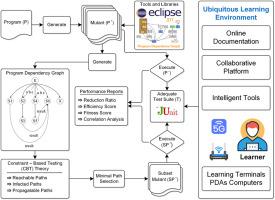Enhancing software quality assurance in ubiquitous learning environments through mutation testing and diverse test oracles
IF 9
1区 心理学
Q1 PSYCHOLOGY, EXPERIMENTAL
引用次数: 0
Abstract
Ubiquitous learning enables software analysts to acquire knowledge and design test oracles from online resources including developer documentations, forums and collaborative platforms. Test oracles are primarily designed by humans and may contain quality defects. Mutation testing can facilitate the adaptability of ubiquitous learning to enhance software quality assurance. Unfortunately, mutation testing generates a large number of faulty versions known as mutants to analyze the quality of test oracles which is computationally expensive. In this paper, we proposed minimal path selection strategy to select fewer and non-trivial mutants to analyze diverse test oracles realizing ubiquitous learning environments. The proposed selection strategy explores the relationship between faulty conditions and output statements to identify feasible paths. To establish a ubiquitous learning setup, diverse test oracles are selected by incorporating user input, automated scripts and developer insights. This approach aims to enhance learner engagement and effectively design test oracles. The empirical evaluation and state-of-the-art comparison of various Java-built software programs demonstrated the potential of ubiquitous learning in software quality assurance by reducing 75% of the generated mutants. Furthermore, only 64%–85% of adequate test oracles were required to meet the desired quality assurance criteria. The study highlights the significance of personalized and adaptive approaches to assure software quality in ubiquitous learning environments.

在泛在学习环境中通过突变测试和多样化测试指标加强软件质量保证
泛在学习使软件分析人员能够从在线资源(包括开发人员文档、论坛和协作平台)中获取知识并设计测试指标。测试指标主要由人类设计,可能包含质量缺陷。突变测试可以促进泛在学习的适应性,从而提高软件质量保证。遗憾的是,突变测试会产生大量被称为突变体的错误版本来分析测试字典的质量,计算成本很高。在本文中,我们提出了最小路径选择策略,以选择较少且非琐碎的突变体来分析实现泛在学习环境的各种测试指标。所提出的选择策略探索了故障条件与输出语句之间的关系,从而确定了可行的路径。为了建立无所不在的学习环境,需要结合用户输入、自动脚本和开发人员的见解来选择不同的测试任务。这种方法旨在提高学习者的参与度,并有效地设计测试任务。对各种 Java 构建的软件程序进行的实证评估和最新技术比较表明,泛在学习在软件质量保证方面具有潜力,可减少 75% 的突变。此外,只需要 64%-85% 的适当测试示例就能满足所需的质量保证标准。这项研究强调了在泛在学习环境中采用个性化和自适应方法来保证软件质量的重要性。
本文章由计算机程序翻译,如有差异,请以英文原文为准。
求助全文
约1分钟内获得全文
求助全文
来源期刊

Computers in Human Behavior
Multiple-
CiteScore
19.10
自引率
4.00%
发文量
381
审稿时长
40 days
期刊介绍:
Computers in Human Behavior is a scholarly journal that explores the psychological aspects of computer use. It covers original theoretical works, research reports, literature reviews, and software and book reviews. The journal examines both the use of computers in psychology, psychiatry, and related fields, and the psychological impact of computer use on individuals, groups, and society. Articles discuss topics such as professional practice, training, research, human development, learning, cognition, personality, and social interactions. It focuses on human interactions with computers, considering the computer as a medium through which human behaviors are shaped and expressed. Professionals interested in the psychological aspects of computer use will find this journal valuable, even with limited knowledge of computers.
 求助内容:
求助内容: 应助结果提醒方式:
应助结果提醒方式:


